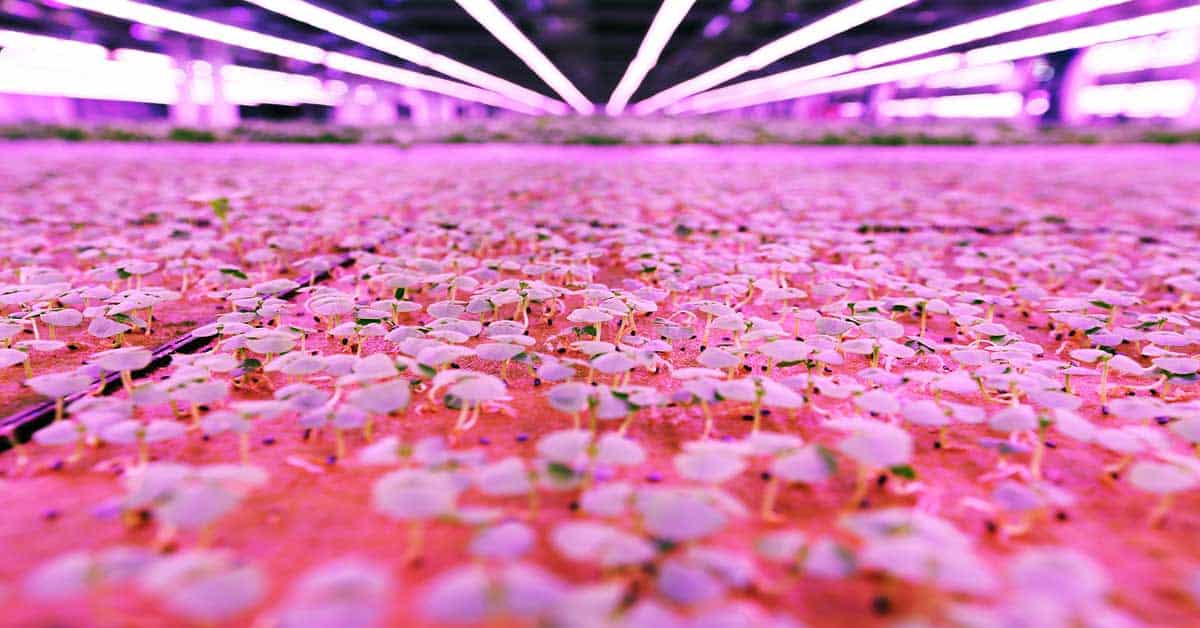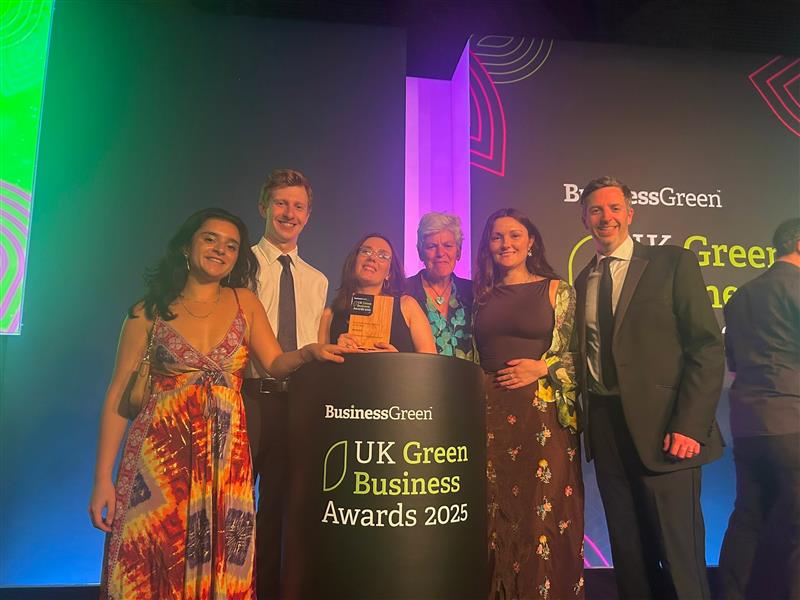Food Innovation Pioneer: James Lloyd-Jones, Jones Food Company

Our food system is ripe for change. With more than two-thirds (68%) of the world’s population expected to live in urban areas by 2050 (UN), it’s a race to find new ways to grow crops closer to home without compromising the health of people or planet. Luckily there are no shortages of innovative thinking around this – vertical farming being one of the most promising solutions to our growing population and urbanisation.
This booming sector is projected to reach $12.77 billion within the next five years (Allied Market Research). Unlike traditional farming, indoor farming has the advantage of year-round crop production, minimal water use, no pesticides and best of all, it’s local!

We spoke to James Lloyd-Jones, founder and CEO of Europe’s largest vertical farm. The Jones Food Company (JFC) is on a mission to grow the huge volumes of food necessary to feed the world’s population sustainably, locally and affordably. JFC has overcome one of the key challenges in the sector: scalability and profitability. This is why the company has built the largest high-care vertical farm in Europe capable of growing hundreds of tonnes of herbs and leafy greens a year. And this is just the beginning!
Tell us about JFC – what’s your mission?
In terms of mindset, I believe you have to go big with your first vertical farm. Once you do, the challenges and business environment is completely different. I got my first round of funding in early 2018, bid for the building where we built out first building in October that year, and it’s never been turned off since. It’s this constant running that has helped us focus on where we have to work hard. Our team is still quite small; we’re only 25 and I don’t think I ever went in so much with a mission. I just wanted to prove to myself and others that it can be done. Vertical farming isn’t new; it’s been around a long time if you think about the fact that the first vertical farming systems were built in 1965.
I didn’t come from a horticultural background, so I think that gave me an advantage. All I did was come in with the mindset of “let’s make it work”. Not having the academic background just meant I was trying lots of things very quickly and just kept doing that.
My focus is on ensuring that we are part of a sustainable food system. Every farm – new and existing – is completely carbon neutral from the start. We do this by using renewable solar sites, water capture systems and a minimal amount of fertiliser.
Now, my goal is to make vertical farming completely boring in the same way that no one really talks about greenhouses with much excitement. Once vertical farming reaches that point, I’ll know we’ve done something really great because it will be in the mainstay of food, pharmaceutical and cosmetic supply chains. So that is my mission, to roll these out anywhere in the world and they become the cookie cutter.
What drives you?
Making vertical farming profitable. Without making money you can’t keep pushing on with the innovation. We will keep working really hard to standardise, commercialise and roll out our technology, which is both scalable and modular. And use as much clever technology as possible to ensure these solutions work in pretty harsh environments. I think we’re only five years away from that reality.
Why have you chosen to venture in vertical farming?
It was one of five ideas I had on a list for seven years. And this was, and still is, number one my list. I just haven’t gotten to number two yet.
What is your greatest achievement to date?
It’s still being in business. We’ve got a really great team and I believe in the systems we design. We add good value in our business in the fact that we both design the hardware and software. We build the system and we grow crops – the most important thing – which we then sell in bulk, rather than small amounts. We then get to learn from those sales, which influences the design changes we make to improve the system.
Having said that, there’s so much to go for. The world is a very big place. There’s so many people that need feeding. We need to not only conquer just leafy green salads. We’re looking at some very exciting new areas. And once that’s done, you can then move the carbon neutral needle, as I call it.
What are the challenges you face?
The consumer, unfortunately, is quite detached from the modern food chain and we’re often paying bargain prices for food products. [At JFC] we pride ourselves on growing something that’s highly nutritional, has a longer shelf life, uses no air miles, and is still at the same price as a consumer is willing to pay.
What are you working on that’s getting you fired up and excited?
Everything. Every day I wake up and think how can we be better and not fail today? When I say fail, I don’t mean fail as a business. If we looked at something that didn’t quite work, let’s not worry about it. Let’s move on and go, why didn’t it work? How can we improve it and crack on? I’m always looking for ways to get that extra 1%.
We are working in all sorts of markets where we’re overseeing everything from potatoes to normal crops. I’m trying to make sure we meet the price point, always maximising the space for us and bringing down the cost so it’s much cheaper to the consumer.
Where do you want to take JFC next?
We want to go in all ranges! There’s so much opportunity and we’re extremely impatient to go for it. So for me, it’s how we can build the right team as a starter. We don’t have an interview process, as it were. It’s really about finding some extra great talent, keep building and keep refining. But also not forgetting the key driver: we have to grow lots and lots of products well, and sell it. That’s what it all comes down to.
Where do you see the food industry in five to ten years’ time, and where do you hope to see it?
In five years, I see a change in consumer perceptions towards their food, especially with the younger generation wanting to be more aware. I don’t expect there’s going to be too big of a change in that time frame. Maybe I’m a bit pessimistic, but hopefully in five years you’ll see our systems penetrating and being the backbone behind a lot of suppliers.
I don’t think the food industry is as nimble yet to change. However in ten years, you’re probably going to see the likes of Impossible Foods, and similar companies, doing quite well. I think we’re going to see some amalgamation in the new technology food firms becoming bigger companies that will possibly be bought out by multinationals such as Kraft or Unilever.
It may sound like a boring answer, but at the moment it’s not an industry that the public have a huge amount of vision on. The younger generation will likely put more pressure on the food industry to create more sustainable and nutrition food products. So I see a seismic change happening maybe in 10 years, but not five.
Read more about other vertical farming pioneers and stay tuned over the coming months as we continue to spotlight and interview more businesses as part of our Food Innovation Pioneers series. If you’re a pioneer tackling sustainability in the food industry, please get in touch with the Greenhouse team at info@greenhousepr.co.uk.


